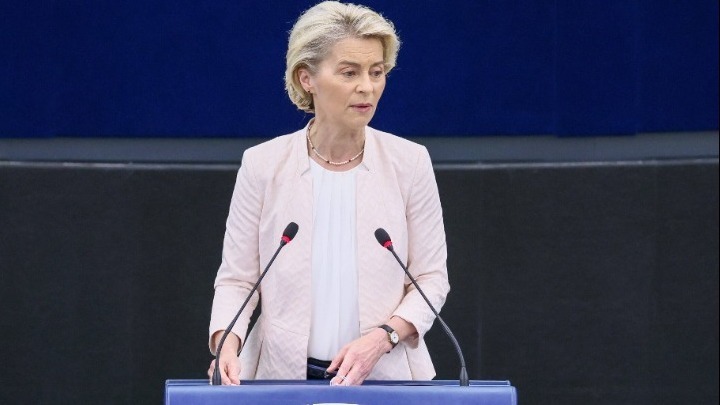EU wants to shift the rule machine into reverse gear.
With the proposal “A Competitiveness Compass for the EU,” the President of the European Commission, Ursula von der Leyen, announces a regulation simplification “unprecedented.”
Along with faster permits and better access to financing, it aims to strengthen the EU’s competitiveness compared to other regions of the world.
“Restoring Europe’s competitiveness requires us to go much further than before in reducing bureaucracy,” the proposal states.
At a press conference in Brussels, von der Leyen asserted that the EU needs to wake up to a completely new economic reality.
“Europe’s economy has been based on cheap labor from China, cheap energy from Russia, and outsourcing of security (to the USA, ed.)”
“Those times are over. Now we see that the EU is lagging behind the USA and China. Therefore, we must address our weaknesses,” says Ursula von der Leyen.
The European Commission wants to address this by easing the regulations that cost European companies time and resources to comply with, including the green regulations.
The European Commission will, however, maintain its green ambitions, von der Leyen asserts.
“Climate change is real. We are experiencing that they destroy prosperity across the globe. I want to emphasize that Europe remains committed to our target of climate neutrality by 2050,” says von der Leyen.
Nevertheless, she will present a simplification proposal next month, which includes a “far-reaching simplification” in reporting on, among other things, sustainability.
In the proposal, the European Commission itself points out that “two out of three companies” believe that “the regulatory burden is the biggest obstacle to long-term investments.”
Companies criticize, among other things, that it takes a long time to obtain permits, for example, to launch products.
This allows companies in other parts of the world to overtake European companies.
The European Commission itself acknowledges in the proposal that “it makes Europe a less attractive place to invest compared to other regions.”
The goal for the European Commission is to reduce the “reporting burden” by 25 percent for all companies and by at least 35 percent for small and medium-sized enterprises.
Additionally, the proposal also aims to strengthen the EU’s presence in the AI market.
The EU has come under renewed pressure after the President of the United States, Donald Trump, presented the enormous AI proposal called Stargate last week.
Trump intends to allocate a staggering 3,500 billion kroner to build AI infrastructure. It is expected to create thousands of new jobs in the USA.
The EU is already lagging far behind the major American and Chinese companies in artificial intelligence. But von der Leyen hopes the competitiveness compass can help create AI companies in Europe.
“We will provide startup companies the opportunity to use supercomputers to train their AI models. We will invest significantly in that,” says von der Leyen.
Among the measures in the proposal is also an opening to give European companies preference when the public places orders.
“Now we have a proposal for how we can strengthen the EU’s competitiveness. That is the goal of the competitiveness compass,” says von der Leyen.
 go to the original language article
go to the original language article
